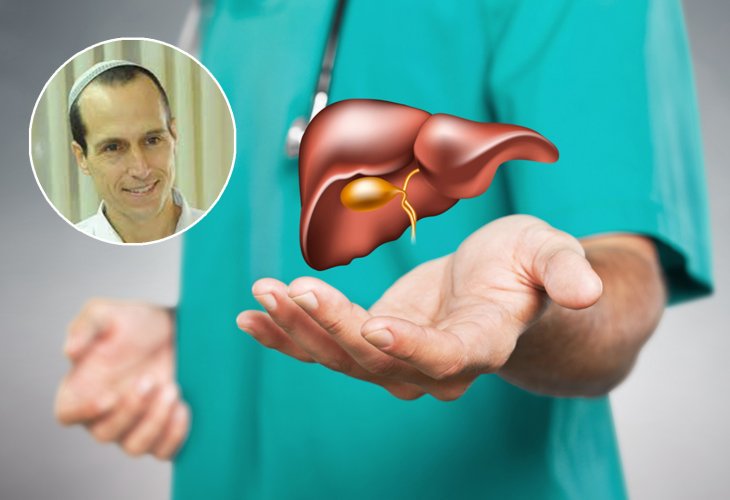Tearjerker: 'I Flew to Donate a Liver in Germany, to a Jew I Never Met'
On hearing Itzik's mother's plea for a liver donation, Yaniv Kendel immediately reached out, promising to fly to Germany to donate his liver. Leaving behind his pregnant wife and two small children, he underwent a month and a half of tests, until an unexpected twist on the day of surgery.
 Background photo: shutterstock, In the circle: Yaniv Kendel (Photo: Yoni Ben Haim)
Background photo: shutterstock, In the circle: Yaniv Kendel (Photo: Yoni Ben Haim)"I don't think I did anything special; I'm not a big hero, and for me, it was simply natural," says Yaniv Kendel as he recounts his unbelievable story of deciding to donate a liver lobe to a stranger and traveling overseas for an indefinite period to do so.
"I am not a special person," he adds. "Today, I am almost fifty, a father of eight and a young grandfather. I have been lecturing for over twenty years on a wide array of subjects like the human body, history, the Bible, science, and more. The liver donation story is also often a source of conversation, especially when encouraging donations and volunteerism. Initially, I planned to keep it a secret, but I often find myself sharing, hoping it will reach the right ears and inspire others."
"You Can't Stand Idly By"
Yaniv remembers the story's beginning well, despite the many years that have passed: "It was 21 years ago. I was driving to work one routine morning, busy and in a hurry. For no apparent reason, just before getting out of the car, I turned on the radio. I caught the end of an interview on Galei Tzahal, where a distressed woman pleaded for people with type O+ blood to help her son. I didn't understand the context, but knowing my blood type matched, I quickly noted the phone number, called, and left a message with my name, saying I'd be happy to help.
"By evening, she returned my call and explained she was the mother of a 27-year-old named Itzik, who had been hospitalized following a series of abnormal tests, revealing a ten-centimeter cancerous tumor in his liver. Doctors were at a loss, unable to perform surgery to remove the tumor; the only option was a special procedure at a German hospital.
"Elisabeth, Itzik's mother, shared that the German hospital agreed to remove the tumor along with 70% of his liver, leaving him with a very borderline 30% for functioning. But they also required that he finds someone willing to lie next to him, just in case they couldn't leave even the 70%, to use as a live donor and transplant a liver lobe into Itzik. This, Elisabeth explained, is what they needed me for, to be Itzik's ticket into the surgery room and donate a liver lobe if necessary."
 (Photo: shutterstock)
(Photo: shutterstock)What went through your mind when you heard this request?
"At that moment, I was on a long drive home, it was dark outside, and my thoughts overwhelmed me. On one hand, there were all the logical reasons not to undertake this risky surgical procedure. It's an invasive abdominal operation accompanied by pain and risks, to be performed in Germany, leaving behind my pregnant wife and two young children, aged three and five. Who knows how long it would take, when I'd return, and in what state?
"But on the other hand, there were two very compelling factors that ultimately drove me to commit. The first was the genuine faith in Hashem. Both my wife Naama and I felt tangibly that we were about to help a person live, and surely Hashem would protect us. The second decisive factor was my incredible wife, a wonderful woman of kindness, who listened to the reasons and said confidently, 'We cannot stand idly by, let's put aside all personal comfort, and you go help him.'
Yaniv pauses for a moment to emphasize: "Itzik's family turned to search for donors only after close family members were tested and found unsuitable, and even among friends who volunteered, none were found suitable. They had no choice, which is why Elisabeth reached out to the radio, hoping to touch someone's heart."
Indeed, she touched Yaniv's heart. Within three days, he completed all the preliminary tests, which indicated a good chance of compatibility, and by the same week, he was on a plane to Germany.
A Month and a Half in Germany
For those wondering how a few days of tests could be enough to approve such a significant surgery, Yaniv explains: "The tests I underwent in Israel were merely to establish a reasonable likelihood of compatibility, so I wouldn't fly in vain. But once in Germany, I underwent a month and a half of grueling, comprehensive tests of all kinds and types to ensure I was healthy and not risking myself by donating, and of course, that I was indeed suitable to donate to Itzik, and the liver lobe would not be rejected, heaven forbid."
One of the most emotional moments of the journey was remembered by Yaniv as the moment he landed in Germany and met Itzik for the first time in his life. "We were almost the same age then," he notes, "Itzik was twenty-seven, and I was twenty-eight, but externally, one might think we had nothing in common. I wear a knitted yarmulke and come from what is termed a 'settlement,' while Itzik had dreadlocks, earrings, tattoos, and was from the complete opposite end of the social spectrum."
Yaniv pauses and shares an interesting insight: "As religious people, we all know to recite the saying from Pirkei Avot, 'Don't look at the vessel but at its contents,' but putting that into practice is quite difficult as our perception is intuitively very critical, and it's a shame. Our particular situation led us to spend a month and a half together, and I discovered a brilliant, gifted genius with whom it was a true delight to spend time. Additionally, Itzik was the happiest and most optimistic person I've ever met, making me laugh from the moment we met. He taught me a lot about our perspective on life, reinforcing in me the feeling that one can learn from every person, no matter their outer appearance."
The month and a half in Germany were exhausting, not just because of the tests but also because of the culinary issue. "I didn't account for the lack of kosher food there," Yaniv clarifies, "and for the entire period, I had to mostly rely on fruits and vegetables, all while preparing for a significant surgery for which it's very important to strengthen the body. But truthfully, it didn't concern me that much because the tests occupied all the hours of the day. Every test was approached with a pounding heart, aware that if anything turned out to be wrong, the efforts would go to waste, and Itzik's lifeline would slip away.
"Our biggest fear was facing the ethics committee, which had to ensure that I wasn't being coerced or paid in exchange for the liver but was donating willingly and with awareness of the risks. We were very worried the committee would reject us, as they're used to seeing cases of family members or close friends of the patient. We knew that stating I had never met Itzik could raise significant suspicion. Therefore, we kept this fact hidden and assured them I wasn't receiving any payment, which was entirely true. Even later, when Itzik's father offered money, a lot of it, I refused to accept a single shekel. My goal was to help Itzik, and I truly didn't aim to gain anything. Apparently, we managed to convince the committee, and once they approved the donation, our path to surgery was paved."
Drama During the Surgery
Yaniv remembers every detail of the surgery day. "The operation was on a Monday, but we were admitted on Sunday," he recounts. "The thought of being connected by blood to someone you didn't know a month and a half ago was incredible and moving. On the evening before the surgery, Itzik received calls one after the other. I wouldn't exaggerate if I said hundreds called to wish him health and success. The most moving part was that his friends, who came from similar backgrounds, were connecting to their Jewish essence in those moments. I heard one say he was at the Western Wall, another in the Cave of Elijah, there was someone who informed him he was praying in Uman and lighting candles for his recovery, and many more. It was amazing and touching to see the Jewish spark truly burning within each one."
And what about you? Did you share with family and acquaintances?
"My wife and I didn't tell anyone, including our parents. Anyone who tried to find out where I was, received the vague response, 'Yaniv went to accompany a friend with cancer in Germany,' which was true. My mother had strong intuitions and called me daily, but we still took care to keep it secret. Truthfully, we initially planned not to talk about it even after the donation because I personally feared the forbidden feeling of pride, fearing I might think I was doing something momentous, large, and rare. To this day, I feel it wasn’t an act of special heroism. It seemed very natural and necessary that if a person is reaching out from a pit of suffering, death, and pain and I have a way to help, I should make that effort for him. Ultimately, Itzik's friends were the ones who spread the story to the media, allowing me to tell it in various forums. To this day, I'm invited to lectures, believing it can empower and encourage good deeds among our people."
Yaniv revisits the dramatic hours of surgery: "At seven-thirty in the evening, they took Itzik to the operating room while I was sedated in the ward where we were admitted. It was previously clarified to me that the surgery would begin immediately, and only after removing the tumor from Itzik's liver would it be possible to see how much liver tissue was removed along with it, determining the next steps. Two hours later, at nine-thirty, a surgeon woke me up, updated me that the surgery had started, but there was still no complete picture, so they weren't sedating me again, but I should be prepared as I might be called into the operating room any moment. It's been 21 years since, yet I remember every word spoken, even the curl on the doctor's forehead.
"Another four hours of nerve-wracking waiting passed until one-thirty, when the doctor entered the ward, approached the bed, grabbed my hands, looked me in the eye, and said one sentence: 'Yaniv, we saved Itzik's liver!' He added, We don’t need you.
 (Photo: shutterstock)
(Photo: shutterstock)Does that mean you ultimately didn’t undergo the surgery?
"Exactly. In a miraculous and wondrous way, Hashem helped save Itzik's liver. Initially, they talked optimistically about leaving 30% of the liver, but inexplicably, the tumor detached from the liver, leaving 70% intact. It was a real miracle."
And what did you feel at that moment?
"Initially, I was stunned and couldn’t speak. The next moment I wanted to tell the doctor, 'Take my liver and give it to someone else, how can it be that after being here for a month and a half, I'm not donating?' But I quickly realized this news was actually the best for all of us. Itzik's only goal was to undergo the surgery, and because I was beside him, he was operated on. Itzik completed the surgery safely with his own liver, and I continued living in good health with a whole liver—Hashem arranged everything for us in the best way."
And it’s impossible not to ask: Do you currently keep in touch with Itzik and his family?
Yaniv pauses. The question clearly pains him. "In the first weeks after returning to Israel, we maintained close contact," he finally says. "Unfortunately, after about a month and a half, another liver tumor and a lung tumor were discovered. When cancerous tumors are in two organs, a transplant surgery isn't performed.
"Sadly, Itzik passed away nine months after we returned from Germany, but in that time his wife had become pregnant, and she gave birth to a daughter three months after his passing. She named the child 'Ong' because Itzik was such a happy person, even during suffering and decline, when asked how he was, he responded with one word: 'pleasure.'"
Yaniv pauses, then adds: "Indeed, the story's end is tragic; we all wished it had ended differently, but considering that due to my donation, Itzik had left behind a daughter, who with Hashem's help will continue to bring future generations into the world, it's understood that nothing is coincidental, and there was truly special and extraordinary Divine assistance."
In conclusion, he addresses the technical aspect: "When I share my story, I often hear people horrified by the risk I took. It's important to emphasize that the decision wasn't taken lightly. I have a background in anatomy, and for many years I taught about the human body. One of the liver's known and remarkable properties is its ability to regenerate. So when 40% of the liver is taken and given to a patient, 60% remains, but in less than a month, the 40% regrows, and the liver becomes whole and healthy again. There is high awareness of kidney donations in Israel, but regarding liver donations, there is almost no awareness, and people don’t really know. Although it is a complicated surgery, the risks are not major, and in the vast majority of cases, the lobe left in the body regenerates perfectly. Without a doubt, donating such a contribution is a noble and important act, and those who are able can be assured that, with Hashem's help, they are truly saving lives."
Yaniv Kendel: Yanivkendel@gmail.com

